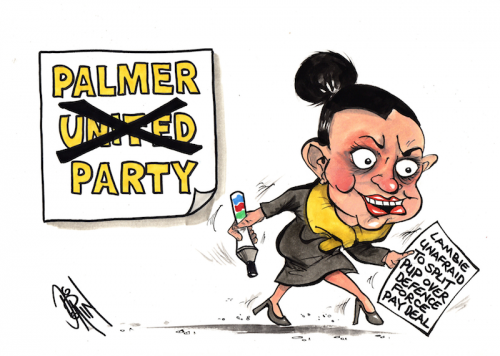 A GREAT challenge for any cross-bench politician is understanding the use and abuse of power.
A GREAT challenge for any cross-bench politician is understanding the use and abuse of power.
Senator Jacqui Lambie’s recent threat to simply oppose all government legislation unless she gets what she wants demonstrates the problem. She is zealous about ensuring the military get a fair pay deal, which is completely understandable and many will laud her stance. However, the technique she has adopted to coerce the government is an inappropriate and disproportionate use of power.
Cross-benchers who use their power wisely ensure more accountability in government. Without a balance of power situation, a majority government simply runs a three-year dictatorship with an opposition just carping on the sidelines through the media and in parliament.
In many ways Senator Lambie is a breath of fresh air. Her passion is undeniable. Her naïve approach is in marked contrast to the staid and controlled new senators of the major parties. However, there are some fundamentals that she is yet to learn.
Contrast the Lambie approach with that of the “most respected politician in Australia” (according to a “Reader’s Digest” poll), Senator Nick Xenophon, who served for eight years in the SA Upper House and is an independent senator for SA. He provides a clear warning of the risks of this type of negotiating technique for newly elected cross-bench senators.
In his inaugural speech to the Senate in August, 2008, Xenophon explained the misuse of power.
“I also do not believe in horse trading. Horse trading implies a willingness to vote for something you do not believe in in order to get something else you want,” he said.
“When people do try to horse trade they can end up with a donkey or, worse still, end up making an ass of themselves”.
Senator Lambie should heed the warning and avoid the risk of making an ass of herself.
Even on this issue alone, it is not her first failure to understand the importance of context.
Initially she called for soldiers to hijack Remembrance Day and turn their backs on government MPs speaking in honour of Australia’s war dead. Rightly, this plea was widely condemned, including by the RSL, the government and the opposition. Understanding the context is critical for people in a position of power.
There will be many issues taken on by cross-benchers that do not receive support from the major parties. However, few will actually be condemned in this manner. Xenophon did not get support for attempts to restrict poker machine use – but his efforts were not condemned in this manner. Jacqui Lambie has been elected as one of 76 senators and should recognise her power in this context.
No doubt there have been many issues that have been supported by Lambie and other cross-bench senators. However, the media pays little attention to the majority of issues that pass through the Senate by agreement and focuses on areas of conflict.
There is a basic complexity in this aspect of parliamentary negotiations. On issues of conflict, the major party in opposition regularly discards its own power. It deals itself out of the game, effectively delegating much of its power to the cross-benches.
There are two elements: other than with conscience issues, strong party discipline does not allow senators to take an alternative stance. This restricts the ability to negotiate. Secondly, the willingness to play oppositional politics often removes the opposition party from the negotiating table.
Having parliaments held accountable by the cross-benches adds another element of scrutiny to our democratic processes. The damaging part of horse trading is that this misuse of the balance of power puts at risk the very accountability that cross-benches provide. Xenophon pointed out in an article published in “Crikey” in July: “ABC elections expert Antony Green has confirmed that the 2013 election was a new high in a 30-year climb in support for non-major parties, recorded at 21 per cent support in the House of Representatives races and 32 per cent for Senate races”.
Support has been constantly growing for minor parties and independent parliamentarians. However, if cross-benchers abuse their power, the voters will flock back to the major parties.
Michael Moore was an independent member of the ACT Legislative Assembly (1989 to 2001) and was minister for health.
Who can be trusted?
In a world of spin and confusion, there’s never been a more important time to support independent journalism in Canberra.
If you trust our work online and want to enforce the power of independent voices, I invite you to make a small contribution.
Every dollar of support is invested back into our journalism to help keep citynews.com.au strong and free.
Thank you,
Ian Meikle, editor





Leave a Reply